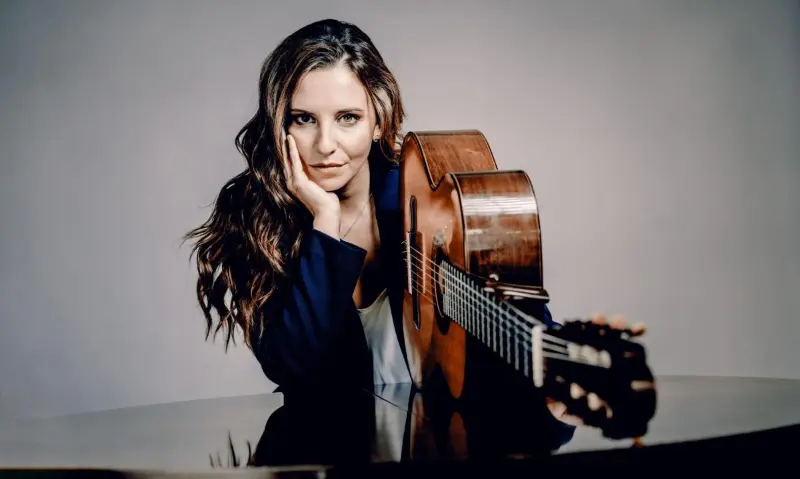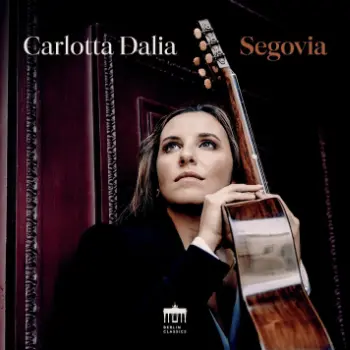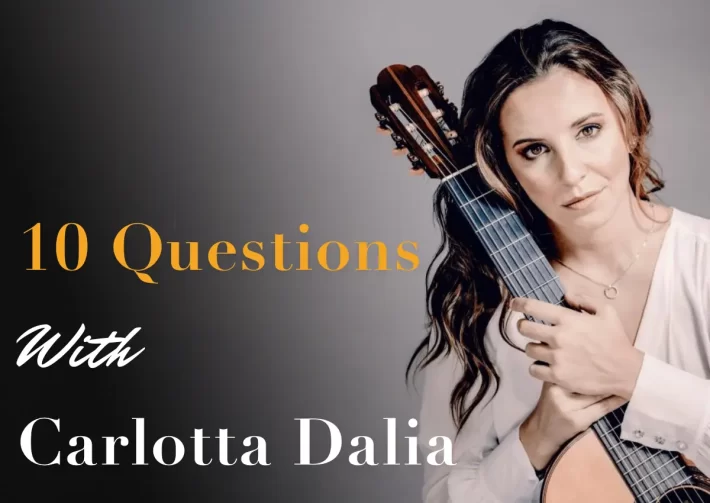Guitarist Carlotta Dalia answers The Classic Review’s 10 questions.
Where will she most likely find inspiration? How many hours does she practice each day? And what is the classical music album she couldn’t live without?
What new repertoire are you currently working on?
I am currently working on Rodrigo’s Concierto de Aranjuez, which I will be performing in the coming months. Additionally, I am preparing a beautiful recital program for guitar and cello that I am performing with cellist Maximilian Hornung. The program features Schubert’s Arpeggione Sonata and works by Spanish composers such as Granados and Albéniz. Of course, I am also presenting my recent solo guitar program dedicated to Segovia, following the release of my new album.
What’s a piece of music you don’t currently play but wish you could?
There are two pieces in particular that I would love to study and perform in concert: Heitor Villa-Lobos’ Guitar Concerto and Manuel María Ponce’s Concierto del Sur. These are two magnificent concertos that showcase a different musical language compared to the ones I have performed so far, especially those by Italian composers like Mauro Giuliani and Mario Castelnuovo-Tedesco. These works allow the guitar to express itself in a unique way, contrasting with the virtuosic character of the famous Concierto de Aranjuez. In particular, Villa-Lobos’ concerto holds a special appeal to me, and I would truly love the opportunity to perform it.
Are there any classical composers whose music you don’t quite connect with?
I think it’s natural to feel a stronger connection with certain composers or repertoires than with others. Music is such a personal experience, and it’s normal to have preferences or affinities. When I first approached Alberto Ginastera’s Sonata for Guitar, I struggled to fully grasp its bold rhythmic energy and raw, primal character. It felt distant from my usual musical language, and I couldn’t immediately find my way into it. However, through dedicated study and deeper exploration, I eventually discovered a key to interpreting its contrasting moods and distinctive Argentine identity. It taught me that even when a piece initially feels elusive, perseverance can reveal unexpected layers of expression and insight.
What was the latest contemporary music piece that impressed you?
I am currently studying Sidolira, a guitar piece by the renowned Mexican composer Gabriela Ortiz. Ortiz is known for blending traditional and contemporary elements, creating a unique musical language that truly enhances the guitar’s expressive potential. Her music often incorporates influences from Spanish and Mexican music, highlighting the instrument’s versatility and rich timbral qualities.
🎧 Gabriela Ortiz on Amazon
🎧 Gabriela Ortiz on Apple Music
How much time do you dedicate to practicing each day? What are your best tips for developing effective practice habits?
It really depends on where I am and what my schedule looks like—whether I’m traveling or preparing for a concert that day. Like everyone else, I adjust my practice time based on my circumstances. On an ideal day, when I have time to dedicate to practice, I believe that around five hours of focused practice is the perfect balance. One of the most important aspects of my practice is working on sound production, which is one of the most challenging elements to manage on the classical guitar. My most effective approach to practicing is to work slowly and deliberately, paying attention to every movement and maintaining full concentration. It’s far better to practice four or five hours with true focus than to spend eight hours with your mind wandering elsewhere.

Carlotta Dalia (images: ©️ Andrej Grilc)
How do you find inspiration when performing?
I find inspiration in real life and in the experiences I go through personally, as well as in the stories of people I feel connected to and truly know. I consider myself a very empathetic person, so when someone shares a story with me or describes a particular emotion—or when I experience it firsthand—I feel it deeply. I try to translate these real situations into the music I play, as music naturally reflects human moments and experiences that belong to all of us. We all live through these moments in different ways and at different times in our lives, and I aim to embody them through my performance.
Do you experience performance anxiety? If so, how do you manage it?
I believe that the adrenaline before a concert is quite normal, and anxiety, in particular, is simply an excess of focus on the future. It’s the desire to control an event that is about to happen, something we can only truly control at the moment it occurs. So, I think the best approach is to learn how to recognize when anxiety is becoming overwhelming and to understand that, ultimately, we are doing something we deeply care about. It’s natural to feel that way, but the key is to manage it by staying present. When performing, it’s important to focus solely on the music. If the preparation has been solid, the fingers will go where they have been trained to go.
“One of the most important aspects of my practice is working on sound production, which is one of the most challenging elements to manage on the classical guitar.”
If music wasn’t your passion, what other career path might you have chosen?
The guitar has always been the central part of my daily life since I was seven, so it’s difficult to imagine a life without it. However, I’ve always had a strong passion for football. I’m a devoted fan of both Italy and Napoli, and I’ve always loved the sport. If music hadn’t been my path, I would have definitely loved to play football or pursue a career in competitive sports.
What advice do you have for young musicians starting their careers?
I believe that intellectual honesty with oneself and with those around us is crucial. It’s important to be true to oneself and never abandon one’s personality, staying authentic. This is undoubtedly the greatest quality to preserve, as it is also our main source of uniqueness. So, I would advise them to simply follow their passion, even in the professional world, but with the same approach they had when they first started playing—doing it with purity and love for what they do. The rest will be a natural consequence of that.
What classical music album you couldn’t live without?
One classical music album I couldn’t live without is Grigori Sokolov playing Schubert and Beethoven live. I had the privilege of hearing him perform live at the Teatro San Carlo in Naples, and it remains one of the most beautiful experiences of my life.
🎧 See this album on Amazon
🎧 Stream this album on Apple Music
* * *
Guitarist Carlotta Dalia’s new album, Segovia, was released on Berlin Classics. The album includes selected works by the Spanish guitarist and composer Andrés Segovia (1893-1987) and juxtaposes them with compositions by his contemporaries, all played on Segovia’s own instrument. The album also includes a new work composed specifically for Dalia by Enrico Melozzi.
Visit Carlotta Dalia’s website, Instagram, Facebook, Spotify and YouTube.
Carlotta Dalia’s “Segovia” on Amazon

See offers for this album on Amazon.
Carlotta Dalia’s “Segovia” on Apple Music
Join The Classical Newsletter
Get weekly updates from The Classic Review delivered straight to your inbox.

















